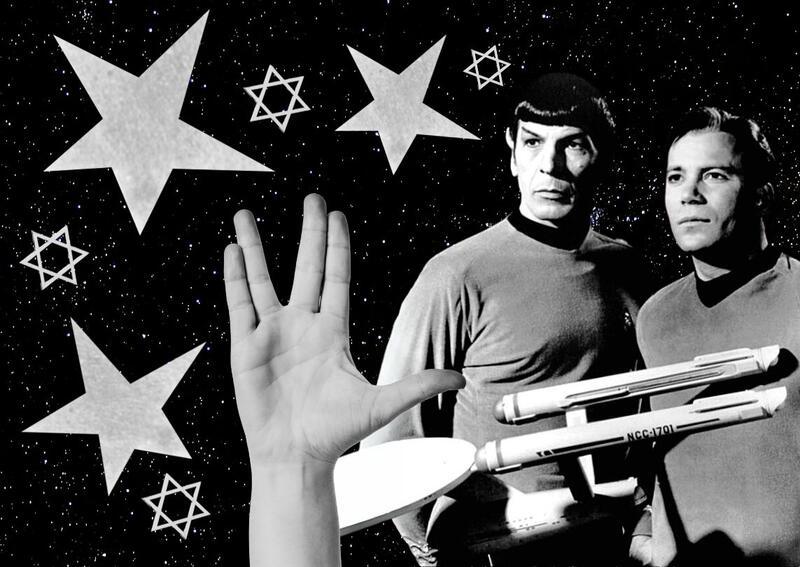The Jewish Collective Seen in Star Trek
“Space! The final frontier…” booms my father, following along with the opening sequence of 1966’s Star Trek, the original series. As was our newfound nightly tradition, my parents and I settled in to watch an episode or two of the highly color saturated sci-fi series. I had quickly fallen in love with the show my father had insisted we watch, from its campy cast of characters to its cheesy 1960s special effects. It was just the right amount of absurd for me to immediately latch on to, as campy sci-fi is my favorite genre.
However, my absolute favorite part of the show was its Jewish influences. Both of the show’s lead actors William Shatner (James Kirk) and Leonard Nimoy (Mr. Spock) were Jewish, and certain religious symbols snuck its way into the show’s lore, such as the Vulcan salute, which was inspired by a Cohenite blessing. I enjoyed the show's covert Jewish content throughout the series, but I most appreciated episode eighteen of the second season for its beautiful Holocaust allegory.
In the beginning of this episode, entitled “The Immunity Syndrome,” the Star Trek Enterprise, the ship captained by James Kirk, attempts to answer a distress call from an approaching vessel called the Intrepid, manned by 400 Vulcans. After the call comes in, Nimoy’s character, Mr. Spock, a Vulcan himself, begins writhing in pain as he telepathically senses each and every one of those 400 Vulcan on board die. Later on, the ship's human doctor incredulously questions just how he was able to feel the deaths of all four hundred Vulcans. In one of the most powerful lines of the show, Spock responds, “I’ve noticed that about your people, Doctor. You find it easier to understand the death of one than the death of a million. You speak of the objective hardness of the Vulcan heart, yet how little room there seems to be in yours.”
The first time my parents and I heard those lines, we stared at each other, mouths agape. We were used to Star Trek’s varied attempts at social commentary, but this was something we’d not seen before. To us as Jewish watchers it was a clear Holocaust allegory, delivered by a proudly Jewish actor, only twenty years post Holocaust. Spock mourns for the mass death of members of his community. Despite him not being there to witness the deaths, he still feels an immense (and tangible) sense of grief. His community is a part of him, and thus, their pain is his pain, too.
This is a perfect representation of the sense of grief that was felt by Jews all around the world during and after the Holocaust as they were mourning for the death of millions. Jews felt the loss of so many of their people so acutely that it moved them to action. For example, in 1882, the Jews in Palestine (prior to the establishment of the State of Israel) sent 37 parachutists, including Hannah Szenes (Senesh), into Europe to aid Jews living under Nazi oppression.
While Spock feels this immeasurable sense of loss, he has to explain to a non-community member, somebody who fundamentally does not understand the experience of his people, why this grief is warranted. The ship's doctor, since he is not a Vulcan, cannot even comprehend what it meant for Spock to feel the death of such a large number of Vulcans. He criticizes humanity’s inability to treat the loss of a million with the same compassion they’d warrant the death of one. Through a Jewish lens, these lines refer to non-Jewish society’s inability to recognize the collective nature of the Jewish communities’ grief. Spock ends this monologue damningly, saying that if humanity could have understood that the death and suffering of a collective is just as important as that of the one it “might have rendered your history a bit less bloody.”
From there, the plotline devolves into a typical episode of Star Trek. As the story progressed, I couldn’t take my mind off Spock’s words. They stayed in my mind the rest of the night, into the next day, and then the following week. Because despite them being delivered nearly sixty years ago, they still ring alarmingly true.
One of the most important aspects of Judaism is the importance of the collective. We see this in the Pesach Haggadah, where out of the four sons, the one who is deemed wicked is the one who actively tries to separate himself from the community. We are an interwoven community that has sustained itself throughout history by uplifting and empowering each other. And when tragedy strikes one group of Jewish people, its communities throughout the world share in that sense of grief.
This piece was written as part of JWA’s Rising Voices Fellowship.







